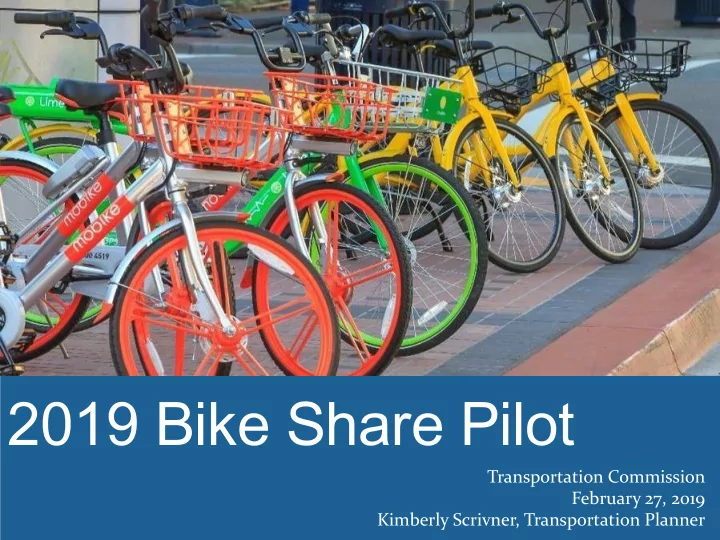

2019 Bike Share Pilot Transportation Commission February 27, 2019 Kimberly Scrivner, Transportation Planner
Discussion Items • Background • Proposed draft bike share program • Recommended actions for Council • Discussion
Background • August 6 th 2018 - Council directed staff to ask the public about bike share • October 6 th 2018 thru January 18 th 2019 – public engagement • January 23 rd 2019 – Commission briefing • February 19 th 2019 – Council directed staff to develop a pilot bike share permit
Summary of Council feedback • Limit total # of operators to one or two • All electric assist fleet, ensure battery charging practices are in-line with environmental goals • Split on including scooters • Measures are important but it should be manageable • Report back to Council periodically during pilot • Share lessons learned from other cities
Lessons Learned from other Cities • Having only one operator makes it difficult to enforce rules • Data reporting can be staff intensive • Designated bike parking locations have been helpful • Be specific in requirements regarding rules and reporting
Managing Bike Parking/ Clutter Require rebalancing of bikes to: • Downtown and Waterfront • Commercial and Mixed Use Areas • Designated locations along the CKC • Designated locations in some parks Identify and mark designated bike parking areas Identify and map ‘no parking zones’
Monitoring and reporting of pilot Key Considerations: • Ability to report on pilot effectively • Privacy of customer data with public records requests • Level of staff-time required to monitor data • Quality of data Methods for data collection: • Operators submit data directly to city - Staff intensive, data quality may have issues • Use third party - Uses direct Mobility Data Specification (MDS) feed, comes with some expense
Monitoring and reporting of pilot (cont.) Reporting Item Data Source Trips (O/D) – real time visibility Vehicles – location and status Third party or MDS feed (can see all (available, in use, out of service) direct report to companies at once) Heat Map city Maintenance Route data MDS feed has sparse data for this Complaints Operators to send directly to city follow-up survey would be likely source Effect on transit ridership of this Crash/ injury data Very difficult to get companies usually don't ask gender, race, Rider information age or other information about riders
Fees and Cost Recovery FEES: Upon Issuance of Permit: • Annual permit fee: $2,032 - Covers cost of staff to review the permit • Per bike “program fee”: $35 - Covers administrative costs + painting and signing designated bike parking • Business license requirement Non-Compliance Fee: • $127 per bike if City crews must move bikes • Performance bond requirement of $80/bicycle OTHER: King County Metro / WSDOT Grant for Eastside Bikeshare • Amount TBD, shared by Kirkland, Bellevue and potentially Redmond Covers Data reporting + Signage/paved parking - locations along the CKC
Competitive Process Have companies address in application: • Company’s waste and recycling policies • Charging of batteries – address how this meets Kirkland’s environmental goals • Equity – how companies address unbanked, low- income and limited English groups
Additional Contents of Permit Requirements • Limiting total # of bikes to 200 per operator (may be increased) • Limit total # of operators to 2 • Require operators to educate customers on safety, parking rules, helmet law • Require financial incentives/ disincentives for appropriate bike parking • Require operators to keep CKC clear of bike obstructions and educate customers about CKC use • Bikes may not sit idle for more than 7 days (unless in designated parking zones)
Contents of permit requirements (2 of 2) • Operator response times for solving problems - Risk to public safety – 2 hours - Impeding transit operations – 2 hours - Other – 24 hours • Operations center within 15 miles; customer service line 6am-9pm daily • City may terminate permits at any time • Data reporting requirements including MDS feed and complaints (monthly reporting) • Report to Council at 4 and 8 months during pilot • Permit requirements can be amended at any time based on data collected or safety concerns • Scooters may be introduced at one of the reporting periods if pilot is going well
Recommended actions for Council • Resolution to Policy G-10 allows bike share as a permissible use in public right-of-way • Resolution to allow the Public Works Director authority to manage rules and limitations for the pilot bike share program • Ordinance to amend KMC 5.74.040 to include a bike share program fee • Ordinance to amend KMC 19.40.020 (CKC Trail Use Regulations) to be consistent with RCW 46.04.168 allowing class 1 and class 2 e-bikes on trails
Discussion
Thank you! Kimberly Scrivner, Transportation Planner kscrivner@kirklandwa.gov
Recommend
More recommend